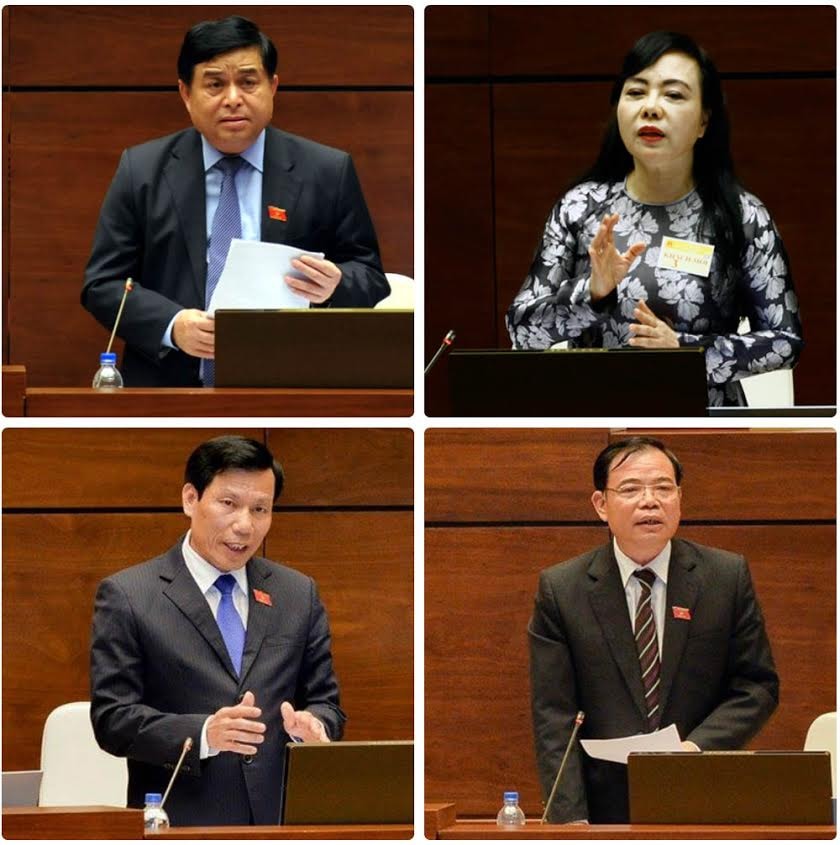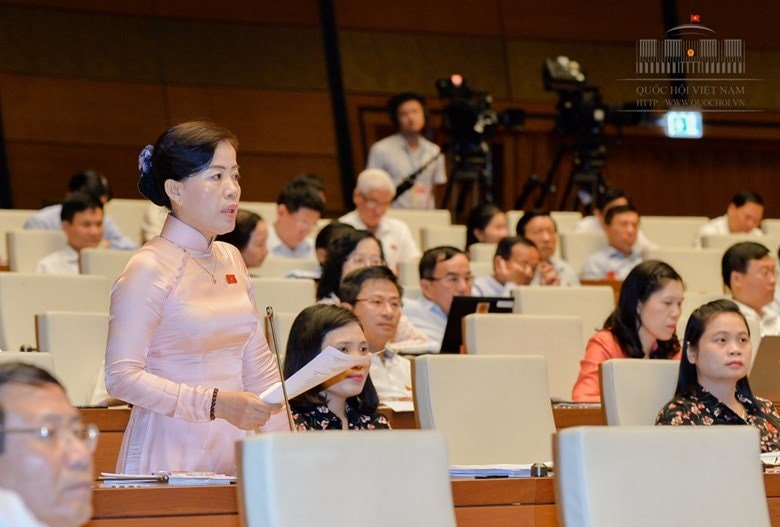The more you question, the more you expose your flaws and accept responsibility.
The more we question and point out the shortcomings and weaknesses of industry leaders, the more willing they are to take responsibility for state management.
At least the people get to hear the public exchange between the ministers and the highest representatives of the people. At least the people get to feel, and can even rate each minister in their responses to questions.
The questions and issues raised and discussed by the deputies all show a real improvement in the quality of questioning. There are almost no more questions that are too detailed, too topical, and not at the level of the ministers' management like many years ago.
The frankness and the pursuit of the minister's responsibility are clearly shown. National Assembly members and voters cannot listen to the song of the whole political system getting involved and taking responsibility. As a minister in the system, the extent of responsibility must be clear. There were National Assembly members who spoke up 3-4 times during the questioning of a minister, but were not satisfied and continued to debate.
 |
Ministers in question and answer session. |
Ministerial capacity and Prime Minister's expectations
People and businesses still remember the oath taken by Prime Minister Nguyen Xuan Phuc when he took on the responsibility of leading the Government for this term, to build a constructive, honest and serving Government. To achieve this goal, the Prime Minister, like the commander-in-chief, must rely on the commanders on all fronts.
The commanders' answers to questions on agriculture, culture, health and planning clearly showed the gap between the commanders' capabilities and the wishes and expectations of the head of government.
The determination, enthusiasm, and responsibility of the industry commanders in answering questions are there, but that is not enough, because the ultimate decision is the capacity of the industry commanders. Hopefully, there is still enough time to erase this gap in the remaining years of the Government's term.
Through questioning, he recalled an old story. It was said that in ancient times, the king entrusted the important responsibility of leading troops to fight against the enemy at the border to a general. This general's command was so bad that he kept losing, not winning a single battle, so he had to urgently report to the court.
The report was intended to state the sad reality that the more they fought, the more they lost. The general's advisor advised the commander and said that it was true that the more they fought, the more they lost, but he could not report to the court like that, because reporting like that would mean losing his position.
I would like to ask the commander-in-chief to change the report and state that the more we lose, the more we fight. This is not wrong from the truth, but clearly emphasizes the spirit of our army, emphasizes the commander-in-chief's determination to fight the enemy to the end, the more we lose, the more we must fight.
 |
Delegate Nguyen Thi Kim Thuy. |
What do we see when we examine the past?
The National Assembly deputies pointed out many issues that are the responsibility of ministers. The industry leaders all accepted responsibility. The more we question and point out the shortcomings and weaknesses of the industry leaders, the more they are willing to accept responsibility for state management.
The reverse of the old story means: the more responsibility is accepted, the more strongly questioned, the more strongly questioned, the more shortcomings and mistakes are seen, the more responsibility is accepted...
If there are shortcomings, then accept responsibility. But is it okay to do so? What is the limit of accepting responsibility? National Assembly members and especially the people hope that this acceptance of responsibility will happen later? Is it true that the conclusion of questioning is accepting responsibility, but how far the responsibility is carried out is another story?
If only there were a regulation in the questioning that if a minister has to admit responsibility before the National Assembly more than three times, then that minister's state management responsibility is considered unsatisfactory, and conversely, if he never admits responsibility, it is considered good...
Not an administrative order
Take the issue of pork surplus in the interrogation for consideration. According to the Minister of Agriculture and Rural Development, the first cause of pork surplus is that in the past 10 years, the livestock industry has grown too quickly, increasing more than 3.6 times from 3.4 million tons of meat/year to 5.6 million tons, milk has increased by 800 thousand tons along with 10 billion eggs.
The second reason is poor organization of the industry, poor linkage between production, processing and consumption.
If so, the Ministry of Agriculture and Rural Development may be innocent. If you look it up, there is something called the Livestock Development Strategy to 2020, which was developed by the Ministry and submitted to the Prime Minister for approval in 2008.
According to the Strategy, the target by 2020 is 5.6 million tons of meat/year, of which pork accounts for 63%, 10 billion eggs, 800 thousand liters of milk. Thus, compared to the expected plan, it is completed 3 years early, but it must be affirmed that these numbers have been expected, planned based on the proposal of the Ministry and approved by the Prime Minister.
Mentioning this Strategy is not only about the responsibility of the Ministry of Agriculture and Rural Development, but more importantly, it is about reviewing what is considered an important tool in state management of the ministries.
There are currently many strategies and plans for the development of industries and sectors. Almost every industry and sector has a strategy and plan. The goals and targets stated in the plans and plans will not be meaningful without accompanying policies and support policies, which must be developed by the ministry.
Sitting down to draw up this plan or that strategy is probably not too difficult, but it will be much more difficult to get society, people, and businesses to accept, comply with, and contribute to the implementation of that plan or strategy, the biggest impact here being appropriate policies, not administrative orders.
The mistakes of the Department of Performing Arts and the General Department of Tourism for which the Minister of Culture, Sports and Tourism took responsibility clearly show that the state management mindset of the subsidy period is strongly reviving: management by issuing many licenses, by prohibitions, and by unreasonable intervention.
According to VNN

